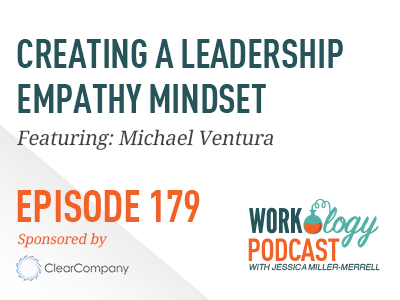Studies on organizational change show that leaders across the board agree: if you want to lead a successful transformation, communicating empathetically is critical. We touched on empathy in a recent podcast on Design Thinking with Dorothy Mankey, and empathy in the workplace is a top of mind topic for those of us in HR today.
A special thank you to our podcast sponsor is ClearCompany
Episode 179: Leading with Empathy with Michael Ventura
Inspired by his SXSW 2019 session, A Crash Course in Empathy and Leadership, I wanted to sit down with Michael Ventura, CEO and founder of Sub Rosa and author of Applied Empathy: The New Language of Leadership. Michael, welcome to the Workology Podcast.
Michael started his empathy work after hearing from his existing design clients at Sub Rosa that they needed support humanizing advertising, marketing and design campaigns he was supporting his clients in. Suffice to say that Michael’s approach is unique not only because of his background but also his interest in alternative medicine which has fueled his passion in this work.
Empathy is on the decline in our society and yet it is one of the most important leadership qualities and skills our employees want from their managers. Research shows empathy declining in groups across society from health care workers to college students. One University of Michigan study revealed that college students’ levels of empathy dropped 40 percent in 10 years.
Three Types of Empathy
Michael shares that there are three different types of empathy: 1) effective empathy, 2) somatic empathy, and 3) cognitive empathy. Effective empathy is loosely described by Michael as “golden rule” empathy. He says it’s the one we probably think of the most. Somatic empathy is a physical reaction, probably based on mirror neuron responses, in the somatic nervous system. And cognitive empathy is defined as the largely conscious drive to recognize accurately and understand another’s emotional state.
From all of this Michael has focused on what is called applied empathy. He says it is a self-aware perspective taking to gain a richer and deeper understanding. Being self-aware is tough obviously because no one can be wholly self-aware and if you worry, but you know the truth is that we can be somewhat self-aware we can know our biases we can know our mood.
[bctt tweet=”The silos and the divisions that have been put up to allow for efficient management of work product have also led to the inefficient ability to connect to each other. People work in their division. – Michael Ventura #appliedempathy #hr #podcast ” via=”no”]
Applying this empathy framework can impact your business in many different ways. It certainly helps you better understand your customers and clients and for your workforce, empathy allows to better relate and understand your work colleagues, peers, and employees. This is extremely important in creating a workplace culture where people and individual ideas and contributions are valued and encouraged. Your culture is an organism that is unique to the organization and should be treated as such.
You can hear more of Michael’s thoughts on empathy and their application in creating a great culture, employee experience, and candidate experience by listening to the full podcast interview.
Connect with Michael Ventura on LinkedIn.
RECOMMENDED RESOURCES
University of Michigan Empathy Study
Ep 174 – Design Thinking in Human Resources ~ podcast
Recruiting Analytics: Getting Started with Google Analytics
Michael’s Book: Applied Empathy: The New Language of Leadership
How to Use Recruitment Marketing to Reach Niche Candidates Like in Manufacturing
Job Candidate & Employee Survey Questions
How to Subscribe to the Workology Podcast
You can also click here to find out how to be a guest on the Workology Podcast.
*A special thank you to my production team at Total Picture Radio.










One Comment
Due to decline in human values and dissatisfied “Work-life balance” Empathy is growing.
Hence implementation of Empathy framework can lead to increase in productivity, decrease in Employee attrition, increased employee engagement etc.
Comments are closed.